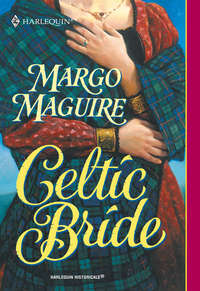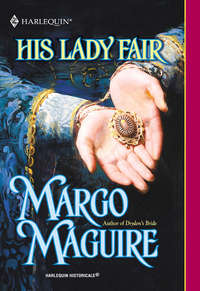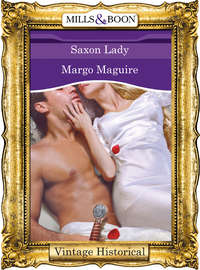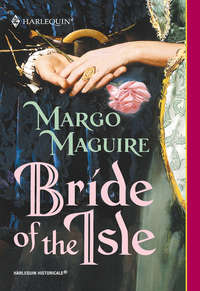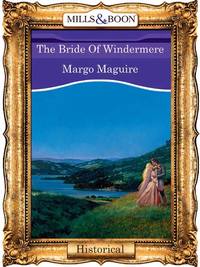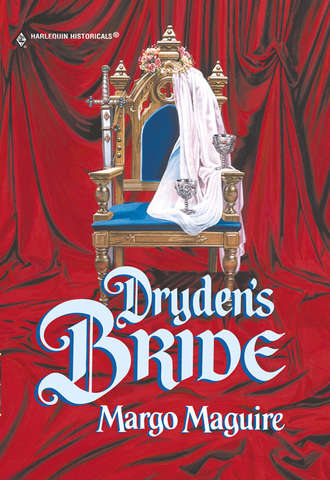
Полная версия
Dryden's Bride
Kit Colston hoped that if Hugh married Marguerite, he would take seriously his duty to defend the border for England, and protect Clairmont holdings for Marguerite’s infant son, John. She was confident that this challenge would rouse Hugh as nothing else had in the last two years.
And if his marriage should become a happy, fruitful one, then all the better.
Sir George escorted Hugh and Nicholas to a pair of chambers where they were to spend the night, and were informed that Lady Marguerite would see them at midday meal, as she had other matters to attend at present. Though they were both somewhat taken aback that Lady Marguerite did not deign to greet her guests immediately, they were even more surprised by the steward’s next words.
“The queen, however,” Sir George said, “is most anxious to see you.”
“The queen?” Nicholas asked. “Catherine is here?”
“She is,” the steward replied as he pulled open the heavy curtains covering the windows. “The royal entourage is here at Clairmont for the remainder of the month…Lady Siân Tudor is part of the queen’s party.”
“Tudor!”
“Squire Owen’s sister,” Sir George explained.
Both men knew Owen Tudor from his presence in the court of Henry V. Neither of them had known, however, that he had a sister—a sister who’d chosen to identify herself in the old Welsh way rather than call herself Tudor. Hugh wondered if there was some reason she hadn’t wanted to be associated with Owen.
Hugh and Nicholas remembered Tudor as a competent young man in King Henry’s court, a man with winning ways. He was exceptionally handsome, ambitious yet careful, and absolutely loyal to the crown. Hugh could not imagine any reason for Siân’s reticence to be associated with her brother’s name, but he let the irrelevant matter drop from his mind, and went along with Nicholas and Sir George to a spacious solar high in the castle tower.
“Your Majesty!” Nick said as he and Hugh knelt before their queen. She was a young woman, as lovely and elegant as ever, tall and slender, with intelligent, light-brown eyes sparkling in welcome. Neither Hugh nor Nick had seen her in over two years. Their last meeting had, in fact, been at the marriage of Kathryn and Wolf Colston in London.
“Your Majesty, it is an unexpected pleasure to see you here,” Nicholas said.
Catherine smiled sadly. “Ah, but London is tiresome this time of year,” she said.
“London?” Nicholas asked.
“Oui. London.” The queen’s eyes sparkled. “And…my brother-in-law and his uncle.”
“So, Gloucester and Beaufort are at it again?” Hugh asked.
Catherine bit her lip and looked away. “I will not become a pawn in their despicable power struggle.”
“What is it this time?” Nicholas queried.
“A hideous little plot to get me wed.”
“Wed? To whom?” Nicholas demanded. Only the council could approve the queen’s marriage, and neither he nor Hugh had heard of any such consent. But the Duke of Gloucester and Bishop Beaufort wielded a great deal of power among the lords of parliament. If either one were to choose a suitable husband for Catherine, and a guardian for her small son, the lords could be persuaded to approve a marriage.
And the “winner” of the power struggle could then control the king through the boy’s stepfather.
“It is of no matter, my lords,” Catherine said with a sigh. “Mon petit Henri and I are not in London. We are beyond the sway of any of his uncles.”
“For now, at least,” Hugh muttered under his breath as he wandered to a far window seat while Nick and Catherine continued to speak quietly together. A little boy, dressed in rich clothing, toddled about the solar, throwing a leather ball at some standing pins, then running to retrieve it and replace the pins, only to throw it again. Before he knew it, Hugh was caught up in watching little King Henry, reluctantly admiring the two-year-old’s patience and ability.
It was unfortunate that his father hadn’t lived to see the boy grow up, hadn’t lived to give him brothers, and to keep the predatory powermongers at bay.
But that was the way of things, Hugh thought. Death claimed them all. And sometimes it was better if death came sooner rather than later.
Outside the window, the sky was blue and a flock of common brown sparrows swooped together, enjoying the play. Mirthful noises drew Hugh’s attention down to the bailey, where a game of camp-ball was in progress. Goals were set up on either end of the lawn, perhaps sixty yards apart. Several young boys with sticks were riding squealing pigs, and trying to hit a large ball into the opposing goal. This was a variation on the game that Hugh had never seen and he gazed down with curiosity. Crowds of people had gathered ’round to watch the play and were laughing at the antics of the players.
And in the midst of it all was Siân Tudor.
She had changed clothes since he’d last seen her, and was now wearing a gown of vibrant blue…the same shade as her eyes. Hugh willed himself to look away, but the sunlight caught the golden strands in her russet hair and he was struck by the radiance of her person. Had he seen any such brightness of color these last few years?
Hugh doubted it. He’d seen only the colors of war in France, then the dismal darkness of Windermere’s torture chamber.
Shaking off the thought, he watched Siân Tudor as she moved among the players, her lucent voice occasionally floating to his open window, her lithe movements drawing his eye, her joyful enthusiasm bewildering him. What reason, he wondered, had she to be so jubilant?
Likely no reason at all. She was obviously an empty-headed, frivolous child.
Siân clapped her hands and stopped the play, unaware of her audience up high in the tower above her. “Not legal!” she cried, trying to contain her laughter at the silliness of the game. It was unlike any form of camp-ball she’d ever played, but the pigs had been herded into the bailey, and the thought of riding them had been just too comical to resist. “You must guide your sows back to the line of pumpkins and begin again!”
“Aw, m’lady,” one boy cried as his teammates clamored with him, “you are ever changing the rules! We were so close—”
“Nay, Jacob Johnson!” Siân yelled, laughing out loud now, “you may not argue with the judge, or you’ll be further penalized!”
“But—”
“No exceptions,” Siân interrupted his plea. “Now! Go on!”
The game resumed as Siân ran alongside the field of play, turning one wayward pig back into the fray and helping another boy back onto his “mount.” She enjoyed sporting with the children, organizing games and outings. It was what she had done at Westminster to while away the dull days as her brother worked out plans for her future. Never had it occurred to her that he would buy her into a nunnery.
She was trapped. Without a proper dowry, with no property to speak of at all, and a somewhat tarnished family reputation, marriage into a reputable English family was highly unlikely, not that it was especially desirable to Siân. Though Owen had managed to insinuate himself into the king’s house, and had even engendered a high degree of trust among the English elite, Siân knew that she, herself, was a lost cause. Because she got into trouble more often than not, there wasn’t a man in the kingdom who was willing to take her to wife.
Even in Wales, she’d been something of a pariah. Living at the house of one uncle or the other, Siân never felt she really belonged anywhere. Even in Pwll.
That was all she ever really cared about—belonging somewhere. For years she’d dreamed of Owen coming to take her away from Pwll. But it was not to be, not now, not ever. She could only hope that at St. Ann’s she would finally find her place. In the environment of the cloister, mayhap she would be alone no longer.
“Siân!”
She turned to look, only to see her brother’s stormy face as he approached the playing field. She hardly knew him, but she was quite familiar with this face. Owen had left Wales years before, leaving Siân to be raised by their mother’s brothers while he went to live with a noble family near London. How different things would have been, Siân thought, had he grown up with her in Wales. Perhaps he would not be the tiresome, humorless gentleman she now saw before her.
Owen grabbed her by the arm and hauled her off to a small enclosure near the kitchen. Then, in angry hushed tones, he lambasted her again for her indecorous behavior.
“Is it not possible for you to join the other ladies in their work?” Owen asked, frustrated with his sister’s lack of womanly accomplishments.
So tall and handsome, Owen kept himself impeccably attired. He was very determined to overcome the sins of their father, who had taken a prominent part in a Welsh uprising against King Henry IV. Siân, with her unsophisticated ways and lack of feminine charms, could never further Owen’s cause, as well they both knew it.
The ladies of court shunned her, not wishing to associate themselves with one so common, so unschooled in courtly ways. To make matters worse, various young courtiers had attempted to seduce Siân soon after her arrival at Westminster, thinking that because of her naive, ingenuous manner, she would willingly provide a convenient outlet for their lust. Her repeated refusals had not won her their admiration.
“I am sorry, Owen,” Siân said contritely, her gaze flitting back toward the game. “I am a poor weaver, as you know, and my stitchery is cursed by the very—”
“Do not say it, Siân!” Owen admonished, slapping his thigh in fury, his fair complexion darkening. “Your language is appalling, as is your dress…Look at your hair…where is your veil? By the Holy Cross, sister, do not disgrace me here!”
“I shall try not to, Owen,” Siân said, truly sorry to have caused him such distress. She would try harder. She surely would. If only he would care for her half as much as he cared for his position in the queen’s court. Siân cast her eyes downward and noticed a smattering of dirt and dust across the hem of her bright blue silk kirtle.
And wondered how she would get it clean by mealtime.
“Nervous?” Nicholas asked. They were to meet Lady Marguerite in the castle garden just before the noon meal.
Hugh snorted with disdain.
“I merely asked,” Nicholas said. “Were I meeting my intended bride, I’m certain I’d be…”
Seated on a wooden bench near some stone statuary, was the lady in question, along with an infant in her arms.
“…dumbfounded.” Nicholas concluded his sentence as the two men laid eyes on Marguerite Bradley. She was a beautiful woman, with shining black hair arranged intricately and becomingly around her head. Her violet eyes were sparkling and lovely, framed by thick, black lashes. The lady’s demeanor was gracious and serene, her movements elegant and graceful as she received Hugh and Nicholas.
“Welcome to Castle Clairmont,” she said, her voice a pleasing melody to the ear, laced with undertones of her native French. “I am Marguerite Bradley, and this is my son, John.”
Servants brought chairs for the gentlemen, and a nurse took the infant from his mother. When they had completed their greetings and were seated, an awkward silence ensued. Even Nicholas, who seemed always to have something to say, was rendered speechless by the lady’s poise and exceptional beauty.
“I trust your journey was a pleasant one?” Marguerite asked. Her gaze flitted uncomfortably from Hugh’s scarred appearance to Nicholas’s more comely one.
“Yes, quite,” Nicholas said, and they spent a goodly portion of time discussing the best kind of weather for travel and the incident in the wood that morning with Lady Siân and the boar.
Hugh was quiet, his usual state, leaving most of the conversation to Nick. He’d become accustomed to ladies’ reactions to his eye patch, and the scars that emanated from beneath it, and it had no effect on him anymore. Oddly enough, Lady Marguerite also had little effect on him.
He realized, of course, that she was breathtakingly beautiful, but he could not muster much enthusiasm for taking a wife. He tried to appreciate the delicate arch of her black brows, and her flashing violet eyes, the aristocratically straight nose, and voluptuously full lips. But it was useless. Whether or not he wed this woman, Hugh knew he was destined to a life of lonely isolation. For no one would ever come to understand the blackness of his soul.
The music that Queen Catherine brought to Clairmont delighted Siân. Naturally, the queen had her own musicians and minstrels, and they provided an enchanting accompaniment to every evening meal.
As Siân sat in her assigned seat at supper, she wished for some of Lady Marguerite’s elegance and competence. Not only did the countess’s beautiful and saintly appearance do her credit, but as chatelaine of Clairmont, Marguerite kept everything in splendid order. All of Lady Marguerite’s domain was neat and organized. Guests and servants alike were simply perfect.
Siân picked at the food in the trencher she shared with her tablemates as she watched all the noble gentlemen at the dais vie for Marguerite’s attention.
All but Hugh Dryden, Earl of Alldale. He was different from the other Saxons. He alone seemed indifferent to Marguerite’s abundant and obvious charms, and held himself apart from the excessive adulation. Though he kept his face carefully expressionless, Siân noted the familiar spark of intelligence in his eye.
Alldale was truly a man alone, Siân thought. She’d sensed that about him in the woods that morning and had been wondering about him ever since. He was not a handsome man, exactly…. Still, there was something about him: a depth of fortitude and endurance that had surely served him in the past. A man wouldn’t survive the kind of injuries that had damaged and scarred Hugh Dryden without a well of inner strength from which to draw.
Of all the ladies on the dais, only Queen Catherine seemed unaffected by Hugh Dryden’s appearance. The scars that were barely concealed by the leather patch…the ravages to his hand…Siân knew Hugh must be aware of the aversion he aroused, and her heart went out to the quiet and solitary man. She, at least, knew what it was to be alone in the world. Siân doubted that anyone else on the dais knew what that was like.
Alldale joined in the conversation only when addressed, and Siân considered that he might be ill at ease among the highborn folk at his table. He was like one of the hawks she’d seen out in the woods. With craggy features and a taut, sleek power, hawks prized freedom above all else. Flying high above the land, circling, riding the wind, they were masters of their domain, subject to no one.
Hugh Dryden was as well made as any hawk, Siân thought, with powerful arms and chest, and strength enough to carry her without effort through the forest that morning. She doubted there was anything that could ruffle the feathers of this man, outside of being caged here in polite company, listening to the idle chatter of the queen’s ladies and gentlemen.
Her Majesty eventually took her leave of the company, along with several of her ladies and gentlemen. The minstrels stayed in the hall, continuing to entertain those who remained. Siân forced herself to ignore the thinly veiled, lewd remarks made by the young London courtiers with whom she was seated, and cast several furtive glances toward the main table, hoping to catch a few more glimpses of Hugh Dryden. It did her heart good to see that he remained indifferent to the glorious Marguerite. It was gratifying to know that at least one man in England was unaffected by her perfection.
Soon after the queen’s departure, Hugh excused himself and Siân watched as the earl made his way through the hall and out the main doors. She couldn’t help but wonder how and where this solitary man would choose to spend his time.
And as she daydreamed girlishly about the way his powerful arms had lifted her and carried her so chivalrously through the woods, Siân knocked over her goblet and spilled ale all over her blue gown.
It was the only decent one she had left.
Stone walls began to close in as darkness approached and Hugh often sought solace outside, where the open sky was immense and he could breathe easily. He walked through the town of Clairmont and followed a path up a hill, then down into a clearing to a small lake with a rugged, rocky bank.
Hugh sat on a large, flat rock near the water’s edge and threw a stone into the black depths, where it sank with a plunk! Then he threw another.
He breathed deeply.
It had been a strange day. He’d killed a boar with an arrow. Found his target and dispatched the arrow to its mark. Without hesitation, without fail. A quick, clean kill.
He nearly smiled.
Plunk!
The darkness that dwelled inside him day after day refused to be assuaged by that puny success. He was still half blind, still a maimed man. Tonight, as usual, he would be unable to sleep without images of red-hot tongs and sharp little knives plaguing him. He would see his enemy’s leering face and feel the tongs burning his eye; the cruel mallet breaking fingers and toes….
Plunk!
In the two years since his ordeal, it had been the same. He’d been stripped of his honor, of his potency as a man. Held prisoner like a child, he’d suffered every depravity with as much dignity as he could rouse. Though his dignity had been sufficient, his faith and endurance had not. He’d reached a point where he’d closed himself off from consciousness intentionally, rather than suffer the agonies planned by the twisted earl of Windermere. He’d have bargained away his soul for his freedom.
He had given in to a knight’s ultimate disgrace. Despair.
How could he possibly offer himself as husband to the chatelaine of Clairmont? How could he tie himself to that beautiful, accomplished lady? Hugh was a man with nothing more than a title, an estate…a past. There was nothing for him to offer Marguerite of Clairmont. There was no future for Hugh Dryden.
A light drizzle began to fall and a thin mist gathered across the surface of the lake. Hugh wondered if it would thicken much, for he’d lost his appreciation of the beauty of the mist. Where once it had leant an unearthly, magical appeal to his world, it now made him feel trapped, suffocated.
That was something he could not bear. He’d spent days—he could never be sure how many—chained in the darkness. Unsure what his fate was to be. Waiting…always waiting.
From nowhere came the sound of running feet along the packed earth of the path, disrupting his dismal thoughts. Partially hidden by the rocks where he sat, Hugh turned to see if the intruder was visible in the near darkness. Dark clothing concealed the figure as it ran down toward the lake, but the sound of weeping was clearly a woman’s.
Something about the voice was familiar. Untamed, bronzed hair and a dusty blue kirtle came to mind, along with flashing eyes and soft, delicate skin.
Hugh sat still, hoping she would go away. Instead he saw her drop to the ground near some large stone boulders a short distance away, and commence to weeping in earnest.
He did not care to have his peace shattered by this gauche display of emotion. But if he moved off his perch on the rock, he’d surely disturb the young woman, and have to deal with her—a choice he was not pleased to make.
He could end up waiting forever for her to be done with her foolish tantrum, and leave. He saw no choice but to approach her.
How could life be so cruel? Siân wondered as she stifled her sobs. She sat up with her back to a cold, standing stone, and wrapped her arms around her knees, wiping her eyes. She’d never been much of a one for tears, knowing they couldn’t change anything, but the past few weeks had shown her how utterly useless she was—how entirely inept and clumsy. ’Twas no wonder she was to be consigned to a nunnery. What man in his right mind would have her?
Owen was lucky St. Ann’s had taken her so cheaply.
She could not go home—for there was no home anymore, now that her uncles were dead; her aunts and cousins barely eking a living for themselves as it was. Not that Pwll had ever been any great haven for her, but at least she’d understood her place. She’d always known what was expected of her.
The unpretentious people of Pwll were accustomed to seeing her in mended and dusty kirtles. They had come to expect her to instigate frolicking games and pageants, and caroles, and rhyming contests. Siân didn’t understand what was so wrong with merriment; of sharing mirth and joy with others.
She had firsthand knowledge that there was more than enough sorrow in the world, without having to look for it. Her life in Wales had not been an easy one, especially as the daughter of Marudedd Tudor, cohort of Owen Glendower, the Welsh rebel. The Saxon lords—one hateful earl in particular—had been especially severe with her people after the uprising, and Siân had suffered as much as any of the other villagers. Perhaps even more, because she’d been doomed to a life apart—tolerated, but kept separate from the people she considered her own.
Siân and the people of Pwll learned early that closeness to a Tudor only brought tragedy.
Oblivious to the mist in the air, Siân hugged her knees, resting one cheek against them. Sniffling once. Hiccuping.
She had been reluctant to leave Pwll along with everything and everyone familiar. In the weeks since being summoned by Owen to this foreign, Saxon land, Siân was constantly making mistakes. She didn’t understand the ways of the courtiers in London—neither the men and their improper, unwanted advances, nor the women and their vicious taunts and gossip.
Without understanding what she did that was so wrong, Siân disgraced herself time and time again, invoking Owen’s wrath with every mistake.
Owen had made a fine place for himself as Keeper of the King’s Wardrobe. Now, with King Henry dead, Queen Catherine relied heavily upon Owen for his support and counsel. He could not have a stupid and clumsy sister about. Her incompetence would naturally cast aspersions on him.
Siân leaned back, pulled the sticky cloth of her ale-soaked bodice away from her breast and let the misty rain fall, cleansing her skin of the spilled drink, and her heart of the oppressive thoughts that plagued her. The air was chill, and Siân knew she should return to the castle, but she could not bring herself to confront the ridiculing faces of those who had witnessed yet another ignominious episode in the life of Siân verch Marudedd.
But then, why not?
She would hold her head proudly erect as she walked through the great hall, as she always did, and ignore the sly looks and rude whisperings behind finely manicured, aristocratic hands. She’d lived through enough true horrors in Wales that this, her most recent mishap and Owen’s embarrassingly public censure, hardly rated her notice. So what if she’d spilled her cup of ale? Was everyone in England so infernally perfect, with nary a spill or a speck of dirt anywhere that they could not understand and accept a few small imperfections?
Wiping her tears, Siân got herself to her feet, only to be startled by the earl of Alldale, who’d come upon her without making a sound.
He said nothing, but stood formidably, with his arms crossed over his chest, as if awaiting her explanation for being there.
Siân, having already worked herself up into a defiant, peevish mood, raised her chin. “If you’ve come to laugh at my lack of grace, my lord—” she started to push past him “—rest assured that I am well aware of my shortcomings. I’ve—”
“Look!” Hugh grabbed her elbow and gently guided her back against the rock where she’d sat moments ago, crying. Their presence was concealed as he turned her to look toward the movement he’d noticed in the distance behind her. “Men are gathering in the mist.”
Siân peered down the shoreline, and forgot her own small troubles instantly. Directly north of them, were men leading their horses to the water. They did not appear to be Clairmont people. “They’re wearing plaid,” she said in hushed tones. “We’ve heard that Scottish raiders have been attacking the town and stealing livestock!”


